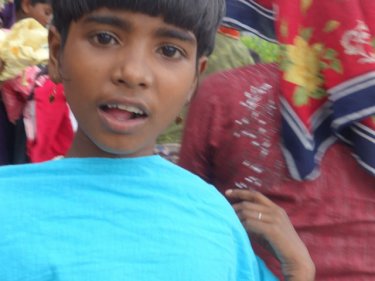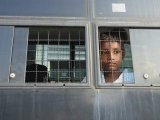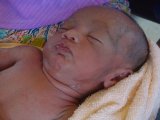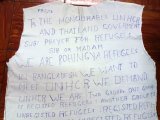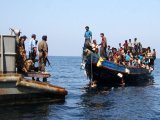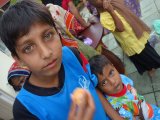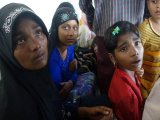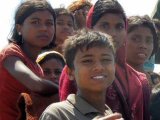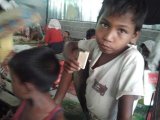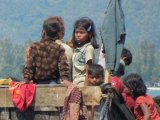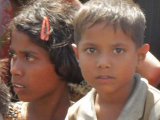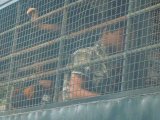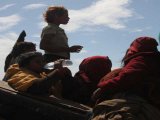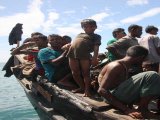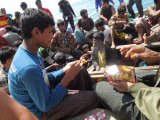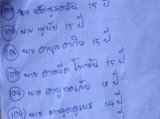PHUKET: Two boys have absconded from a welfare centre for Rohingya women and children north of Phuket, bringing to four the number who have vanished without trace.
Four people at the centre are also being treated for malaria, although conditions at the Phang Nga Home for Family and Children in Khukkhak, a short drive from Phuket, are said to be good.
More concern is being expressed about the disappearance of the boys. Two other boys absconded earlier this month and two more vanished on Tuesday.
According to others at the centre, a man called out in the Rohingya language from outside the refuge. Soon after, the boys, aged about 12, vanished.
It's known that people traffickers have been eager to ''help'' the women and children at the centre achieve their aim of reaching Malaysia, where the husbands of some of them are waiting.
Thai staff at the centre, where there are now 24 women, nine girls and 38 boys, find communications difficult because of the language impasse. Some of the people who have volunteered in the past to translate are suspected of trafficking.
Four sick people sent to nearby Takuapa Hospital were sent back to the refuge centre with medication for treating malaria.
A previous group of women and children, the first to be held at the Phang Nga centre, have been sent on to Surat Thani.
Officials at another refuge, the Songkhla Women and Children Shelter, reported this week that quarrels had broken out and one pregnant Rohingya required hospital treatment after an assault.
Thai authorities are holding 1752 Rohingya boat people, including 310 women and children.
The boatpeople have mostly been apprehended at sea off the Phuket region coast in January or ''rescued'' from secret traffickers' camps along the border between Thailand and Malaysia.
Thailand has agreed to hold the Rohingya for six months while the UN refugee body and other NGOs assess their status and, with the Thai Government, determine their future.
Whether all of them are being housed in acceptable conditions remains the most critical issue for now.
In contrast to the conditions for the women and children, a group of 295 Rohingya men was being held in the Phang Nga Immigration Centre in unacceptably crowded conditions.
Twenty of the men were sent to another centre in Ranong, on the Thai-Burma border, this week. However, deaths in custody are likely if Rohingya are held in cramped cells for long periods.
Two teenagers died in custody in Ranong Immigration in 2009 when a Rohingya group was held for months without sunlight or exercise. Survivors emerged bent double and barely able to move.
Conditions in the Phang Nga Immigration centre are reported to be as crowded as Ranong Immigration was in 2009.
The Rohingya being held in Thailand say they are keen to continue their journey to Malaysia as soon as possible.
A record number of at least 24,000 people have fled intolerable conditions in Burma, also known as Myanmar, mostly since the safer ''saling season'' began in October.
Several branches of the military intercept boats off Thailand's coast to ''help on'' passengers with food and water on condition they do not land in Thailand, yet many Rohingya are trafficked, even while at sea.
Thai authorities, perhaps troubled by the presence of women and children that was first reported on a boatload off Phuket on January 1, exposed the traffickers' camps and for a time stopped the boats.
However, an overcrowded boat containing 205 men and teenagers, intercepted off Phuket on January 29, was ''helped on.''
With Thailand's detention centres bulging with boatpeople, no further ''rescues'' have been made at sea.
This month, two Rohingya boats have been apprehended off Sri Lanka, with both sets of passengers in distress.
The journey from Burma to Malaysia usually takes 12 to 16 days. Voyages that last longer in open boats usually expose passengers to dehydration, thirst, hunger and death.
As many as one in five of the Rohingya boats is reckoned to be lost at sea.
Four people at the centre are also being treated for malaria, although conditions at the Phang Nga Home for Family and Children in Khukkhak, a short drive from Phuket, are said to be good.
More concern is being expressed about the disappearance of the boys. Two other boys absconded earlier this month and two more vanished on Tuesday.
According to others at the centre, a man called out in the Rohingya language from outside the refuge. Soon after, the boys, aged about 12, vanished.
It's known that people traffickers have been eager to ''help'' the women and children at the centre achieve their aim of reaching Malaysia, where the husbands of some of them are waiting.
Thai staff at the centre, where there are now 24 women, nine girls and 38 boys, find communications difficult because of the language impasse. Some of the people who have volunteered in the past to translate are suspected of trafficking.
Four sick people sent to nearby Takuapa Hospital were sent back to the refuge centre with medication for treating malaria.
A previous group of women and children, the first to be held at the Phang Nga centre, have been sent on to Surat Thani.
Officials at another refuge, the Songkhla Women and Children Shelter, reported this week that quarrels had broken out and one pregnant Rohingya required hospital treatment after an assault.
Thai authorities are holding 1752 Rohingya boat people, including 310 women and children.
The boatpeople have mostly been apprehended at sea off the Phuket region coast in January or ''rescued'' from secret traffickers' camps along the border between Thailand and Malaysia.
Thailand has agreed to hold the Rohingya for six months while the UN refugee body and other NGOs assess their status and, with the Thai Government, determine their future.
Whether all of them are being housed in acceptable conditions remains the most critical issue for now.
In contrast to the conditions for the women and children, a group of 295 Rohingya men was being held in the Phang Nga Immigration Centre in unacceptably crowded conditions.
Twenty of the men were sent to another centre in Ranong, on the Thai-Burma border, this week. However, deaths in custody are likely if Rohingya are held in cramped cells for long periods.
Two teenagers died in custody in Ranong Immigration in 2009 when a Rohingya group was held for months without sunlight or exercise. Survivors emerged bent double and barely able to move.
Conditions in the Phang Nga Immigration centre are reported to be as crowded as Ranong Immigration was in 2009.
The Rohingya being held in Thailand say they are keen to continue their journey to Malaysia as soon as possible.
A record number of at least 24,000 people have fled intolerable conditions in Burma, also known as Myanmar, mostly since the safer ''saling season'' began in October.
Several branches of the military intercept boats off Thailand's coast to ''help on'' passengers with food and water on condition they do not land in Thailand, yet many Rohingya are trafficked, even while at sea.
Thai authorities, perhaps troubled by the presence of women and children that was first reported on a boatload off Phuket on January 1, exposed the traffickers' camps and for a time stopped the boats.
However, an overcrowded boat containing 205 men and teenagers, intercepted off Phuket on January 29, was ''helped on.''
With Thailand's detention centres bulging with boatpeople, no further ''rescues'' have been made at sea.
This month, two Rohingya boats have been apprehended off Sri Lanka, with both sets of passengers in distress.
The journey from Burma to Malaysia usually takes 12 to 16 days. Voyages that last longer in open boats usually expose passengers to dehydration, thirst, hunger and death.
As many as one in five of the Rohingya boats is reckoned to be lost at sea.

